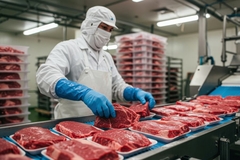US government cracks down on foreign-owned meat-packing cartels amid price-fixing allegations
Key takeaways
- Trump orders DOJ investigation into “big four” meat packers for alleged collusion and price manipulation amid rising beef costs.
- The president claims cattle prices dropped while beef prices rose, though data shows cattle prices actually increased 16–21% in 2025.
- Meat Institute defends packers, stating they’ve operated at a loss for over a year due to record-high cattle costs and tight supply.
US President Donald Trump has ordered an investigation into the nation’s largest meat-packing corporations following allegations of collusion, price fixing, and price manipulation. The president claims that cattle prices have dropped substantially while beef prices have risen sharply over the past year, indicating possible artificial inflation.
“We will always protect our American Ranchers, and they are being blamed for what is being done by the majority foreign-owned meat packers, who artificially inflate prices and jeopardize the security of our nation’s food supply,” Trump announced on social media on Friday.
“While cattle prices have dropped substantially, the price of boxed beef has gone up — you know that something is ‘fishy.’ We will get to the bottom of it very quickly. If there is criminality, those people responsible will pay a steep price.”
One of Trump’s key campaigning platforms in the presidential election was inflation, which initially slowed after he took office but has since risen again, potentially contributing to the major opposition wins in recent local elections.
Meat industry cartels, namely the US’ “big four,” which control roughly 85% of the nation’s meat trade, contain significant foreign business interests. They are: JBS (Brazilian-owned), Cargill (US-owned but with significant foreign influence), Tyson Foods (US-owned), and National Beef.

A DOJ statement confirming the launch of an investigation states that these four conglomerates have, since the 1980s, consolidated to dominate the industry, and as a result, exploited US consumers, farmers, and ranchers.
“Mounting evidence shows this monopoly power has slashed payments to ranchers, reduced herd sizes, driven up consumer prices, and threatened America’s food supply chain,” reads the statement.
Price fixing?
Despite the DOJ’s claims, data show that cattle prices in 2025 have risen significantly, contradicting claims of persistently low valuations. For example, Oklahoma City steer prices for 500–600 lb calves averaged US$347 per hundredweight through mid-2025, representing a 21% increase from 2024 and more than double the average for 2019–2023.
US cattle inventory hit a 70-year low at 86.7 million head, contributing to record-high cattle and beef prices in 2025.Feeder cattle prices for 700–800 lb animals averaged US$281/cwt, marking a 17% year-over-year rise, while fed cattle prices in major markets reached US$215/cwt, up 16% from the previous year.
Industry groups are claiming that reduced cattle supply, driven by prolonged drought, lower calf crops, and heifer retention for breeding, has limited the number of animals available for slaughter, pushing prices higher throughout the production chain.
The US cattle inventory recently reached an 86.7 million head low — the smallest since 1951 — and beef cow numbers have declined to 27.9 million.
Julie Anna Potts, president and CEO of meat packing industry group, The Meat Institute, states that meatpackers are not responsible for rising beef prices, highlighting that packers have been operating at a loss despite higher consumer prices.
“Despite high consumer prices for beef, beef packers have been losing money because the price of cattle is at record highs. For more than a year, beef packers have been operating at a loss due to a tight cattle supply and strong demand.”
“The beef industry is heavily regulated, and market transactions are transparent. The government’s own data from USDA confirms that the beef packing sector is experiencing catastrophic losses, and experts predict this will continue into 2026,” she says.
Meat prices climbing
Last month, Tyson Foods and Cargill agreed to pay a combined US$87.5 million to settle a federal class-action lawsuit accusing them of conspiring to fix beef prices by limiting supply and restricting competition.
Tyson agreed to pay US$55 million and Cargill US$32.5 million in the settlement. The lawsuit, originally filed in 2019, alleged that the two companies, along with other major beef processors like JBS USA and National Beef Packing, colluded to artificially inflate beef prices across the US consumer market by coordinating production cuts and sharing confidential market information.
The settlement marks the first consumer payout in this high-profile litigation involving beef price fixing.
This year, meat prices pushed the FAO Food Price Index higher, rising 1.6% from June to July, reaching 130.1. This effect was mainly due to increases in international meat and vegetable oil prices.
The FAO Meat Price Index reached a new all-time high of 127.3 points, up 1.2% from June. Price increases were led by bovine and ovine meat, driven by strong import demand from China and the US.
Poultry meat prices also rose slightly following the resumption of imports from key partners after Brazil regained its status as avian influenza-free. In contrast, pig meat prices declined due to abundant supplies and reduced demand, especially in the EU.















